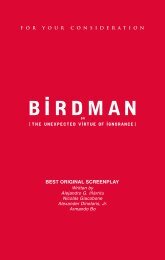- Page 2 and 3:
Blueprints
- Page 4 and 5:
prints Bringing poetry into Communi
- Page 6 and 7:
Contents vii aCKnowledgments ix int
- Page 8:
aCKnowledgments The Harriet Monroe
- Page 11 and 12:
x | Katharine Coles Which, as many
- Page 13 and 14:
xii | Katharine Coles need to.” (
- Page 15 and 16:
xiv | Katharine Coles For my parent
- Page 17 and 18:
xvi | Katharine Coles ally resonant
- Page 20:
section•one alive in the wor(l)d
- Page 23 and 24:
4 | Bas Kwakman The poem went as fo
- Page 25 and 26:
6 | Bas Kwakman the festival search
- Page 27 and 28:
8 | Bas Kwakman its completeness; t
- Page 29 and 30:
10 | Bas Kwakman A good poem by a p
- Page 31 and 32:
12 | Bas Kwakman Alongside Poetry I
- Page 33 and 34:
the seCond throat Poetry Slam patri
- Page 35 and 36:
16 | patricia smith a bottle of bar
- Page 37 and 38:
18 | patricia smith and died for th
- Page 39 and 40:
20 | patricia smith from the sideli
- Page 41 and 42:
22 | patricia smith classroom heard
- Page 43 and 44:
24 | patricia smith And she was Gwe
- Page 45 and 46:
26 | patricia smith In a voice that
- Page 47 and 48:
28 | sherwin Bitsui attended the In
- Page 49 and 50:
30 | sherwin Bitsui Of course, the
- Page 51 and 52:
32 | sherwin Bitsui curriculum of a
- Page 53 and 54:
34 | sherwin Bitsui for themselves
- Page 55 and 56:
the word BeComes you anna deavere s
- Page 57 and 58:
38 | anna deavere smith And so, the
- Page 59 and 60:
40 | anna deavere smith everyone wh
- Page 61 and 62:
42 | anna deavere smith (Resonding
- Page 63 and 64:
44 | anna deavere smith and the ser
- Page 65 and 66:
46 | anna deavere smith After all I
- Page 67 and 68:
48 | anna deavere smith the ground
- Page 69 and 70:
50 | anna deavere smith They were h
- Page 71 and 72:
52 | anna deavere smith without the
- Page 73 and 74:
54 | anna deavere smith I have live
- Page 76 and 77:
tia ChuCha Comes home Poetry, Commu
- Page 78 and 79:
Tia Chucha Comes Home | 59 It start
- Page 80 and 81:
Tia Chucha Comes Home | 61 At the t
- Page 82 and 83:
Tia Chucha Comes Home | 63 size of
- Page 84 and 85:
Tia Chucha Comes Home | 65 but mone
- Page 86 and 87:
Tia Chucha Comes Home | 67 Springst
- Page 88 and 89:
Tia Chucha Comes Home | 69 The wors
- Page 90 and 91:
We Were Here, and We Are Here | 71
- Page 92 and 93:
We Were Here, and We Are Here | 73
- Page 94 and 95:
We Were Here, and We Are Here | 75
- Page 96 and 97:
aBout river oF words robert hass In
- Page 98 and 99:
scaled brevity, their clipped-swish
- Page 100 and 101:
About River of Words | 81 published
- Page 102 and 103:
About River of Words | 83 century A
- Page 104 and 105:
About River of Words | 85 forty yea
- Page 106 and 107:
About River of Words | 87 Poets lau
- Page 108 and 109:
About River of Words | 89 (think th
- Page 110 and 111:
About River of Words | 91 So, by th
- Page 112 and 113:
About River of Words | 93 in Americ
- Page 114 and 115:
About River of Words | 95 writers o
- Page 116 and 117:
About River of Words | 97 handbook
- Page 118 and 119:
About River of Words | 99 culture e
- Page 120 and 121:
My Precious Water, I Kiss You, by P
- Page 122 and 123:
About River of Words | 103 ticide m
- Page 124 and 125:
About River of Words | 105 every ye
- Page 126 and 127:
About River of Words | 107 The firs
- Page 128 and 129:
About River of Words | 109 learning
- Page 130 and 131:
About River of Words | 111 fantasy,
- Page 132 and 133:
About River of Words | 113 and Pame
- Page 134 and 135:
The Poem Is a Bridge | 115 and serv
- Page 136 and 137:
The Poem Is a Bridge | 117 Our firs
- Page 138 and 139:
The Poem Is a Bridge | 119 I believ
- Page 140 and 141:
The Poem Is a Bridge | 121 doing so
- Page 142 and 143:
The Poem Is a Bridge | 123 STAC: sc
- Page 144:
The Poem Is a Bridge | 125 I just r
- Page 148 and 149:
the three goat story Notes on Poetr
- Page 150 and 151:
The Three Goat Story | 131 into a m
- Page 152 and 153:
The Three Goat Story | 133 self-int
- Page 154 and 155:
The Three Goats The Three Goat Stor
- Page 156 and 157:
The Three Goat Story | 137 three or
- Page 158 and 159:
The Three Goat Story | 139 on a tou
- Page 160 and 161:
I. one heart at a time The Creation
- Page 162 and 163:
One Heart at a Time | 143 ing grown
- Page 164 and 165:
One Heart at a Time | 145 now often
- Page 166 and 167:
One Heart at a Time | 147 national
- Page 168 and 169:
One Heart at a Time | 149 judgment
- Page 170 and 171:
One Heart at a Time | 151 tions fac
- Page 172 and 173:
One Heart at a Time | 153 Author an
- Page 174 and 175:
One Heart at a Time | 155 and popul
- Page 176 and 177:
People, Habitat, Poetry | 157 in th
- Page 178 and 179:
People, Habitat, Poetry | 159 how i
- Page 180 and 181:
People, Habitat, Poetry | 161 In Tu
- Page 182 and 183:
People, Habitat, Poetry | 163 music
- Page 184 and 185:
People, Habitat, Poetry | 165 fundi
- Page 186 and 187:
People, Habitat, Poetry | 167 $6.8
- Page 188 and 189:
People, Habitat, Poetry | 169 atten
- Page 190 and 191:
A Place for Poetry | 171 And you ne
- Page 192 and 193:
A Place for Poetry | 173 This littl
- Page 194 and 195:
A Place for Poetry | 175 The new sp
- Page 196 and 197:
A Place for Poetry | 177 • identi
- Page 198 and 199:
A Place for Poetry | 179 • hosted
- Page 200 and 201:
A Place for Poetry | 181 senior cit
- Page 202 and 203:
A Place for Poetry | 183 For me, on
- Page 204 and 205:
A Place for Poetry | 185 • coordi
- Page 206 and 207:
BUILDING FROM A MODEL * * * A Place
- Page 208 and 209:
A Place for Poetry | 189 tive poetr
- Page 210:
A Place for Poetry | 191 and Willia
- Page 214 and 215:
Part 1 an idea, a penCil, and paper
- Page 216 and 217:
Tools for Practical Dreaming | 197
- Page 218 and 219:
Tools for Practical Dreaming | 199
- Page 220 and 221:
Tools for Practical Dreaming | 201
- Page 222 and 223:
Tools for Practical Dreaming | 203
- Page 224 and 225:
Tools for Practical Dreaming | 205
- Page 226 and 227:
Tools for Practical Dreaming | 207
- Page 228 and 229:
Tools for Practical Dreaming | 209
- Page 230 and 231:
Tools for Practical Dreaming | 211
- Page 232 and 233:
Tools for Practical Dreaming | 213
- Page 234 and 235:
Part 2 hammer, saw, and nails Tools
- Page 236 and 237:
Tools for Framing | 217 relishes do
- Page 238 and 239: Tools for Framing | 219 as a 501(c)
- Page 240 and 241: Tools for Framing | 221 tion), and/
- Page 242 and 243: Tools for Framing | 223 Every time
- Page 244 and 245: Tools for Framing | 225 Access Stat
- Page 246 and 247: Tools for Framing | 227 your number
- Page 248 and 249: Tools for Framing | 229 porting you
- Page 250 and 251: Tools for Framing | 231 2. Find out
- Page 252 and 253: NOTE Tools for Framing | 233 1. Som
- Page 254 and 255: MAKE GOOD FIRST IMPRESSIONS Finishi
- Page 256 and 257: Finishing Tools for the Event Itsel
- Page 258 and 259: Finishing Tools for the Event Itsel
- Page 260 and 261: Finishing Tools for the Event Itsel
- Page 262 and 263: Finishing Tools for the Event Itsel
- Page 264 and 265: Finishing Tools for the Event Itsel
- Page 266 and 267: Finishing Tools for the Event Itsel
- Page 268 and 269: Finishing Tools for the Event Itsel
- Page 270 and 271: Finishing Tools for the Event Itsel
- Page 272 and 273: Finishing Tools for the Event Itsel
- Page 274 and 275: Finishing Tools for the Event Itsel
- Page 276 and 277: Finishing Tools for the Event Itsel
- Page 278 and 279: Finishing Tools for the Event Itsel
- Page 280 and 281: Finishing Tools for the Event Itsel
- Page 282 and 283: Finishing Tools for the Event Itsel
- Page 284 and 285: Finishing Tools for the Event Itsel
- Page 286 and 287: Checklist: arrange media and public
- Page 290 and 291: Finishing Tools for the Event Itsel
- Page 292 and 293: Finishing Tools for the Event Itsel
- Page 294 and 295: When Something Goes Wrong—And It
- Page 296 and 297: When Something Goes Wrong—And It
- Page 298 and 299: When Something Goes Wrong—And It
- Page 300 and 301: When Something Goes Wrong—And It
- Page 302 and 303: When Something Goes Wrong—And It
- Page 304 and 305: Part 5 nuts, Bolts, and widgets Too
- Page 306 and 307: Tools for Tinkering | 287 La Piana,
- Page 308 and 309: Idealware. http://www.idealware.org
- Page 310 and 311: Tools for Tinkering | 291 Community
- Page 312: Tools for Tinkering | 293 Poets Hou
- Page 315 and 316: 296 | Contributors lic dialogue on
- Page 317 and 318: 298 | Contributors Patricia Smith i







